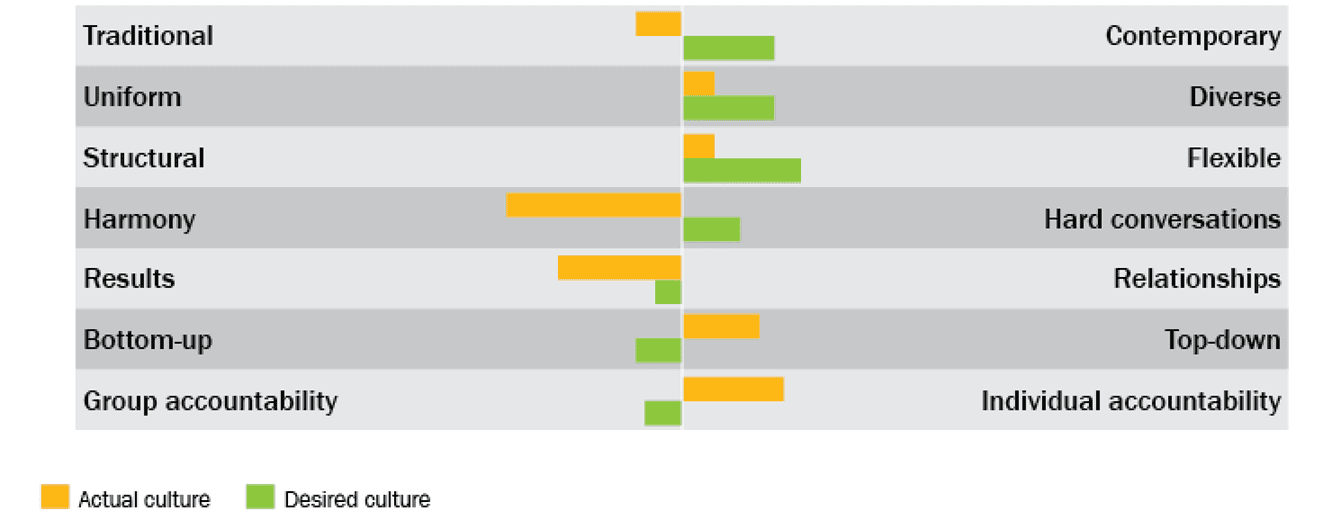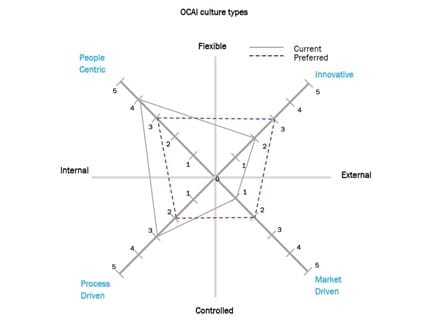The 6 essential ingredients of a customer centric culture
Most business-to-business (B2B) organisations talk about being customer centric. Some go further and say they have a deeply embedded culture of listening and ...
Benchmarking board performance: 500 board reviews later
Unlock evidence-based insights into board performanceEngrain a culture that drives performance whilst upholding the highest ethical standards.
Organisations that are trusted are more successful. Yet trust is not something any organisation can just buy, plan or hope for – it is an outcome. The way an organisation operates and the ownership it takes for what it does and how it does it are key factors in building trust. We measure these things as organisational culture and accountability. Both are measurable and both are critical to sustainable success.
Many organisations spend hundreds of thousands and in some case many millions of dollars crafting their strategy and/or getting advice on how to do that. Many of those same organisations spend a fraction of that investment in gaining a realistic understanding of what is organisational culture, or their current company culture. This neglect comes at the expense of the culture they need to turbo-charge their strategy, and of developing a plan for cultural change in the workplace.
We encourage our clients to invest appropriately in understanding their organisation’s culture, including to identify those areas of their workplace culture that are acting as a hand-brake in the execution of their strategy – and having done so to put in place appropriate plans to transform their culture.
Your organisation can’t be uniform and diverse at the same time, nor can it place a high value on individual accountability and collective accountability at the same time. There will be trade-offs. If you prioritise hard conversations, there will be a trade-off which will result in a lower level of harmony, at least in the short term.
Insync has developed an innovative way to shine a light on the cultural change that is desired to support the execution of your strategy based on the views of your employees. Here is a hypothetical example of the kind of cultural change in the workplace that might be required as revealed by results from using Insync’s cultural trade-offs survey. The results shown are fictitious.


Insync’s cultural trade-offs survey can be used on a stand-alone basis or as a module of your employee engagement survey. Impetus for change can then be grounded in strong evidence and the engagement of all employees.
To get to where you want to go, it’s vital you understand where you are now. Insync’s culture assessment and development tool (based on the Organisation Culture Assessment Instrument developed by Cameron and Quinn) is an extensively researched framework that measures cultural indicators and how well they are aligned with an organisation’s direction, purpose, vision and values. The tool measures four predominant culture types on opposite ends of a flexible vs. controlled, internal vs. external scale:


The culture assessment and development tool provides a complete view of how employees perceive the organisation’s current culture and what kind of culture they believe is essential for achieving success.
We often measure culture by way of a survey of employees, including by using one of the two survey frameworks set out above.
We are also regularly asked to carry out focus groups and/or interviews of employees to gain further insights into the culture of an organisation or a segment thereof. Having done so many of these analyses we are very skilled at providing a realistic description of an organisation’s culture and the cultural changes that will need to be made in order to execute the strategy well.
Accountability is easy to say but without a meaningful accountability management system woven into your DNA you are unlikely to drive consistent levels of performance and ownership across the organisation. Being clear about who is accountable for what, when, and how provides the structure needed to help make faster, better quality and more aligned decisions.
Accountability and performance measurement and management describe how individuals and teams deliver on the promises they make, directly and indirectly, to meet the agreed needs of their stakeholders, through the expectations they express or define. This relationship between needs, expectations and promises is reflected through organisational culture and performance and ultimately leads to trust. This is why measuring workplace culture and accountability can be so important.
If the scaffolding that defines how formal ownership of decisions, tasks and activities across the organisation is not sound, then we shouldn’t be surprised when things go wrong, performance drops, or company culture is poor. Our surveys, interviews, research or other insights will point to a poor accountability framework and organisational culture as a profound root-cause. Measuring accountability, and specifically, how well designed and how effectively implemented the accountability model really is, is an important component of assessing an organisation’s overall capability and what it can do to improve it.
Most business-to-business (B2B) organisations talk about being customer centric. Some go further and say they have a deeply embedded culture of listening and ...
Even in the wake of the Hayne Royal Commission, Australia's C-Suite does not have a realistic view of company culture, according to new Insync research.
Organisations can let their cultures emerge & drift or they can be very intentional & deliberate about how they form and shape them.
This may seem like an outrageous statement to some people but as far as I'm concerned it's absolutely true.
We use cookies to enhance your experience. Further use is considered consent. You can read more about cookies in our Privacy Policy.


You’ll always get a real person when you contact Insync.
Let's get started